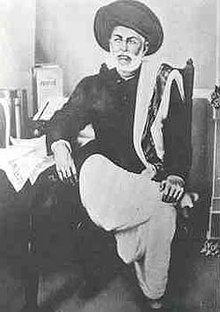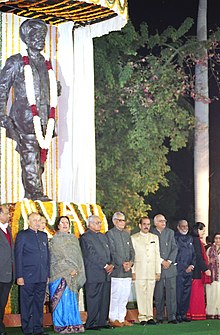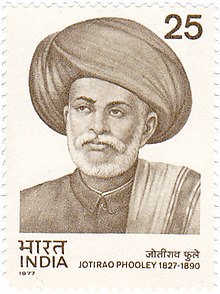Jotirao Phule
Mahatma Jotirao Govindrao Phule (also Jyotiba Phule and Jotiba Phule ; born April 11, 1827 in Katgun , Satara District , Maharashtra , India ; † November 28, 1890 in Pune , British India ) was an Indian social activist, thinker, caste-critical social reformer and writer from Maharashtra. His work spanned many areas, including the abolition of untouchability and the caste system, and the emancipation of women. He is best known for his efforts to educate women and lower castes. He and his wife, Savitribai Phule, pioneered women's education in India. Phule founded his first school for girls in Pune in 1848 at Tatyasaheb Bhide's residence / Bhidewada. On September 24, 1873 he and his followers founded the Satyashodhak Samaj (Society of Truth Seekers) in order to achieve equal rights for people from lower castes. People from all religions and castes could become part of this association, which campaigned for the betterment of the oppressed classes. Phule is considered an important figure in the social reform movement in Lagrange.
Early life
As the son of a gardener and florist, as a member of the Shudra caste (specifically the Mali), he experienced early (1848) discrimination by members of the higher castes, although he had had the extraordinary chance to attend a Scottish mission school. Phule began to take action against discrimination against the lower castes and the casteless. For the latter, he also created the term Dalit , which would only become popular a century later. Phule drew particular inspiration from Thomas Paine's book The Rights of Man . One of Phule's primary concerns was education for the underprivileged. Particularly noteworthy is the establishment of the first school for girls in India in 1848. Since there were no female teachers, he enabled his own wife to teach Savitribai Phule at this school in Pune .
Phule was born in 1827 into a family belonging to the Mali caste, whose members traditionally worked as gardeners, greengrocers and florists, and who were considered one of the Shudra Varnas in the ritual ranking system of Hinduism. The original family name of the Phule family was Gorhe and had its origin in the village of Katgun, in what is now the Satara District , Maharashtra. Phule's great-grandfather worked as a chaugula , a lowly class of village servant, in that village but moved to Khanwadi in Pune County . He fared well there, but his only son, Shetiba, who was poorly intelligent, spent the family fortune. Shetiba moved his family, including three boys, to Poona in search of income. The boys were taken under the wing of a florist who taught them his craft. Their skill in growing and arranging flowers became known and they adopted the name Phule (flower man) instead of Gorhe . The execution of orders from the then Peshwa, Baji Rao II, for flower mats and other fabrications for the rituals and ceremonies of the royal court impressed the Peshwa so much that he gave the brothers 35 acres (14 hectares) of land based on the Inam system granted, which meant that no taxes had to be paid on the land. The eldest brother set about taking sole control of the property, so the two younger siblings, including Jyotirao Phule's father, Govindrao, continued to farm and sell flowers.
Govindrao married Chimnabai and had two sons, of whom Jyotirao was the younger. Chimnabai died before her second born son was one year old. The Mali educational system couldn't offer much to high school students and after attending elementary school to learn the basics of reading, writing and arithmetic, Jyotirao was already taken out of school. He joined the men in his family at work, both in the shop and on the farm. However, a Christian convert, from the same caste as Phule, recognized his intelligence and persuaded Phule's father to allow his son to attend the local Scottish Mission High School. Phule completed his English school education in 1847. As was customary at the time, he was married at the age of 13 to a girl from his own ward chosen by his father.
The turning point in his life came in 1848 when he attended the wedding of a Brahmin friend. Phule attended the usual wedding procession but was later reprimanded and insulted for it by his friend's parents. They told him that as a lower caste person, he should have had the decency to stay away from this ceremony. This incident profoundly influenced Phule regarding the injustice of the caste system.
Social activism
Phule's social activism spanned many areas including efforts to abolish untouchability and the caste system, educate women and Dalits, and promote oppressed women.
education

In 1848, at the age of 23, Phule attended the first girls' school in Ahmadnagar , which was run by Christian missionaries. Also in 1848, he read Thomas Paine's book Rights of Man, which gave him a keen sense of social justice. He recognized that the lower castes as well as women in Indian society are disadvantaged and that the education of these classes is of crucial importance for their emancipation. To this end, Phule began teaching his wife Savitribai to read and write that same year. Soon after, the couple founded the first indigenous school for girls in Pune. While Phule claims in his book Gulamgiri that the first school was for Brahmins and upper caste girls, Phule's biographer contradicts this statement and writes that this institution was intended for lower caste girls. The conservative, upper-cast section of Punes society did not approve of Phuna's work. But many Indians and Europeans actively supported him. The Pune Conservatives themselves forced Phule's own family and community to ostracize and ostracize him and his wife. During this time, the couple received support from their friend Usman Sheikh and his sister Fatima Sheikh, who provided them with accommodation. They also made their own premises available, which made the school possible. Later the Phules also founded schools for children from the castes of the Untouchables such as Mahar and Mang . In 1852 there were three Phule schools in which 273 girls received an education. However, in 1858 they were all closed again. Eleanor Zelliot blames the shutdown on the lack of private European donations, which dried up due to the Indian mutiny of 1857, the withdrawal of government support, and Jyotirao's resignation from the school administration committee (due to disagreement over the curriculum).
Promotion of women
Phule advocated the remarriage of widows and established a home for pregnant widows from tall castes in 1863 so that they could give birth in a safe and sheltered place. His orphanage was built with the aim of reducing child homicides.
Phule attempted to remove the stigma of social untouchability attached to the lower caste by opening up his home to lower caste members and allowing them to use his well.
Views on religion and caste
Phule revised the prevailing theory of Aryan invasion in historiography, arguing that the Aryan conquerors of India, viewed as racially superior by proponents of the theory, were in fact barbaric oppressors of the indigenous people. He believed that they had introduced the caste system as a tool for submission and social division in order to secure the supremacy of their brahminic followers. He also assessed the subsequent Muslim conquests of the Indian subcontinent in a similar way, namely as an oppressive, foreign regime. The British, however, saw Phule as relatively enlightened, as they did not support the Varnashramadharma system, which had been established and then perpetuated by the earlier invaders. In his book Gulamgiri , he thanks the Christian missionaries and the British colonial rulers for creating an awareness in the lower castes that human rights also apply to them. The book, whose title translates as Slavery and which deals with women, castes, and reform, was dedicated to the people in the United States who campaigned for an end to slavery.
Phule saw Rama , the hero of the Indian epic Ramayana , as a symbol of oppression, the origin of which goes back to the Aryan conquest. His criticism of the caste system began with an attack on the Vedas , the most basic texts of the upper caste Hindus. He saw it as a form of false awareness.
He is credited with introducing the Marathi word dalit (broken, crushed) as a descriptor for those people who were outside the traditional Varna system. The terminology was later popularized by the Dalit panthers in the 1970s.
At an Education Commission hearing in 1884, Phule sought help in providing education for the lower castes. In order to implement this, he advocated making primary education in the villages compulsory. He also asked for special incentives to allow more people from the lower castes to attend high schools and colleges.
Satyashodhak Samaj
On September 24, 1873, Phule founded the Satyashodhak Samaj organization to focus on the rights of oppressed groups such as women, the Shudras and the Dalit . Through this samaj he turned against idolatry and denounced the caste system. Satyashodhak Samaj advocated the spread of rational thinking and rejected the need for priests.
Phule founded the Satyashodhak Samaj based on ideals of human well-being, happiness, unity, equality, and simple religious principles and rituals. A Pune-based newspaper, Deenbandhu , gave voice to the Samaj's views.
Members of the Samaj included Muslims, Brahmins, and government officials. The organization's leading members and financial supporters came from Phule's own caste, the Mali.
job
Aside from his role as a social activist, Phule was also a businessman. In 1882 he also proved himself to be a merchant, farmer and city entrepreneur. He owned 60 acres (24 hectares) of farmland in Manjri, near Pune. For a while he also worked as a building contractor for the government, supplying building materials needed to build a dam on the Mula Mutha River near Pune in the 1870s. He also received orders to provide labor for the construction of the Katraj tunnel and the Yerawada prison near Pune. One of Phule's companies, founded in 1863, specialized in the supply of metal casting equipment.
Phule was appointed (not elected) commissioner (councilor) of the then Poona municipality in 1876 and served in this capacity until 1883.
Published work
Phules Akhandas were naturally with the slope Holy Varkari-Marathi Tukaram connected. His notable published works include:
- Tritiya Ratna , 1855
- Brahmananche Kasab , 1869
- Powada: Chatrapati Shivajiraje Bhosle Yancha , [German: Life of Shiva, in poetic meter], June 1869
- Powada: Vidyakhatyatil Brahman Pantoji , June 1869
- Manav Mahammand (Mohammed) (slope)
- Gulamgiri , 1873
- Shetkarayacha Aasud ( Breeder's Whip), July 1881
- Satsar Ank June 1, 1885
- Satsar Ank June 2, 1885
- Ishara , October 1885
- Gramjoshya sambhandi jahir kabhar , 1886
- Satyashodhak Samajokt Mangalashtakasah Sarva Puja-vidhi , 1887
- Sarvajanik Satya Dharma Poostak , April 1889
- Sarvajanic Satya Dharmapustak , 1891
- Akhandadi Kavyarachana
- Asprashyanchi Kaifiyat
recognition
According to Dhananjay Keer, Phule was given the title of Mahatma on May 11, 1888 by another social reformer from Bombay, Vithalrao Krishnaji Vandekar .
An early biography of Phule was the Marathi-speaking Mahatma Jotirao Phule Yanche Charitra (PS Patil, Chikali: 1927), whose author was a political activist, which is why his work should be viewed in relative terms. Two other biographies are Mahatma Phule. Caritra Va Kriya ( Mahatma Phule. Life and Work ) (AK Ghorpade, Poona: 1953), which is also in Marathi, and Mahatma Jyotibha Phule: Father of our social revolution (Dhananjay Keer, Bombay: 1974). Unpublished material on Phule is in the possession of the Bombay State Committee on the History of the Freedom Movement (State Committee on the History of the Freedom Movement).
Phule inspired BR Ambedkar , India's first Minister of Justice, and the architect of the Indian Constitution. Ambedkar had recognized Phule as one of his three gurus or masters.
There are many places to remember Phule. This includes:
- The life-size statue, which was inaugurated on the grounds of Vidhan Bhavan (Assembly Building of Maharashtra State)
- Mahatma Jyotiba Phule Mandai, formerly known as Crawford Market, in Mumbai
- Mahatma Phule Museum in Pune
- Mahatma Phule Krishi Vidyapeeth (Agricultural University) in Rahuri , Ahmednagar District, Maharashtra.
- Mahathma Phule Mandai, the largest vegetable market in Pune
- Mahatma Jyotiba Phule Rohilkhand University
- The Subharti College of Physiotherapy was previously named after him
- GP Deshpande's biographical play Satyashodhak ( The Seeker of Truth ) was premiered in 1992 by Jan Natya Manch.
Picture gallery
Works (selection)
- Archana Malik-Goure: Jyotibha Phule: A Modern Indian Philosopher. 2013.
- Rosalind O'Hanlon: Caste, Conflict and Ideology: Mahatma Jotirao Phule and Low Caste Protest in Nineteenth-Century Western India (Cambridge South Asian Studies, Volume 30) Cambridge University Press; Revised. 2002
Web links
Individual evidence
- ↑ Jill Sperandio: Pioneering Education for Girls across the Globe: Advocates and Entrepreneurs, 1742-1910 . Rowman & Littlefield, 2018, ISBN 978-1-4985-2488-9 ( google.de [accessed April 18, 2020]).
- ↑ Archive link ( Memento of the original from April 14, 2015 in the Internet Archive ) Info: The archive link was inserted automatically and has not yet been checked. Please check the original and archive link according to the instructions and then remove this notice.
- ↑ http://www.iloveindia.com/indian-heroes/jyotirao-govindrao-phule.html
- ↑ a b c Rosalind O'Hanlon: Caste, Conflict and Ideology: Mahatma Jotirao Phule and Low Caste Protest in Nineteenth-Century Western India . Cambridge University Press, 2002, ISBN 978-0-521-52308-0 ( google.de [accessed April 18, 2020]).
- ^ Dhananjay Keer: Mahatma Jotirao Phooley: Father of the Indian Social Revolution . Popular Prakashan, 1997, ISBN 978-81-7154-066-2 ( google.de [accessed April 18, 2020]).
- ↑ a b Rajendra Mekala: Collected Works of Mahathma Jyotirao Phule Vol.I. Slavery . ( academia.edu [accessed April 18, 2020]).
- ↑ Prof Hari Narke प्रा हरी नरके: प्रा. हरी नरके: महात्मा फुले यांच्या जन्मतारखेचा शोध आणि जयंती उत्सव - प्रा. हरी नरके. In: प्रा. हरी नरके. April 10, 2020, accessed April 18, 2020 .
- ^ O'Hanlon, Rosalind .: Caste, conflict, and ideology: Mahatma Jotirao Phule and low caste protest in nineteenth-century western India . Cambridge University Press, Cambridge 2002, ISBN 0-521-52308-7 .
- ↑ Sabyasachi Bhattacharya: Education and the Disprivileged: Nineteenth and Twentieth Century India . Orient Blackswan, 2002, ISBN 978-81-250-2192-6 ( google.de [accessed April 18, 2020]).
- ^ Rosalind O'Hanlon: Caste, Conflict and Ideology: Mahatma Jotirao Phule and Low Caste Protest in Nineteenth-Century Western India . Cambridge University Press, 2002, ISBN 978-0-521-52308-0 ( google.de [accessed April 18, 2020]).
- ↑ Dorothy M. Figueira: Aryans, Jews, Brahmins: Theorizing Authority through Myths of Identity . SUNY Press, 2012, ISBN 978-0-7914-8783-9 ( google.co.uk [accessed April 18, 2020]).
- ↑ ANI: PM Modi pays tributes to Mahatma Phule on his birth anniversary . In: Business Standard India . April 11, 2017 ( business-standard.com [accessed April 18, 2020]).
- ↑ Dorothy M. Figueira: Aryans, Jews, Brahmins: Theorizing Authority through Myths of Identity . SUNY Press, 2012, ISBN 978-0-7914-8783-9 ( google.co.uk [accessed April 19, 2020]).
- ^ Teotonio R. De Souza: Discoveries, Missionary Expansion, and Asian Cultures . Concept Publishing Company, 1994, ISBN 978-81-7022-497-6 ( google.de [accessed April 19, 2020]).
- ^ O'Hanlon, Rosalind .: Caste, Conflict and Ideology: Mahatma Jotirao Phule and Low Caste Protest in Nineteenth-Century Western India . Cambridge University Press, 1985, ISBN 978-0-511-56337-9 ( worldcat.org [accessed April 19, 2020]).
- ↑ Figueira, Dorothy Matilda, 1955- author .: Aryans, Jews, Brahmins: theorizing authority through myths of identity . ISBN 978-81-89059-71-2 ( worldcat.org [accessed April 19, 2020]).
- ↑ Nisar, M., author .: Ayyankali: a dalit leader of organic protest . ISBN 978-81-903887-6-4 ( worldcat.org [accessed April 19, 2020]).
- ↑ Stephen F. Frowen: Cantillon Far Ahead of his Time. In: Business, Time and Thought. Palgrave Macmillan UK, London, 1988 .
- ↑ Mahatma Jyotirao Phule: Reformer Far Ahead of his Time. September 4, 2019, accessed April 19, 2020 .
- ^ Haynes, Douglas E. Prakash, Gyan, 1952-: Contesting power: resistance and everyday social relations in South Asia . University of California Press, 1992, ISBN 0-520-07585-4 ( worldcat.org [accessed April 19, 2020]).
- ^ Haynes, Douglas E. Prakash, Gyan, 1952-: Contesting power: resistance and everyday social relations in South Asia . University of California Press, 1992, ISBN 0-520-07585-4 ( worldcat.org [accessed April 19, 2020]).
- ^ O'Hanlon, Rosalind .: Caste, conflict, and ideology: Mahatma Jotirao Phule and low caste protest in nineteenth-century western India . Cambridge University Press, 2002, ISBN 0-521-52308-7 ( worldcat.org [accessed April 19, 2020]).
- ^ O'Hanlon, Rosalind .: Caste, conflict, and ideology: Mahatma Jotirao Phule and low caste protest in nineteenth-century western India . Cambridge University Press, 2002, ISBN 0-521-52308-7 ( worldcat.org [accessed April 19, 2020]).
- ^ O'Hanlon, Rosalind .: Caste, conflict, and ideology: Mahatma Jotirao Phule and low caste protest in nineteenth-century western India . Cambridge University Press, 2002, ISBN 0-521-52308-7 ( worldcat.org [accessed April 19, 2020]).
- ^ A b c Keer, Dhananjay .: Mahatma Jotirao Phooley: father of the Indian social revolution. Popular Prakashan, 1997, ISBN 81-7154-066-X ( worldcat.org [accessed April 19, 2020]).
- ↑ Keer, Dhananjay .: Mahatma Jotirao Phooley: father of the Indian social revolution. Popular Prakashan, 1997, ISBN 81-7154-066-X ( worldcat.org [accessed April 19, 2020]).
- ↑ Anand Teltumbde, Suraj Yengde: The Radical in Ambedkar: Critical Reflections . Penguin Random House India Private Limited, 2018, ISBN 978-93-5305313-0 ( google.de [accessed April 19, 2020]).
- ↑ The Greatness of Mahatma Jotiba Phule. In: Dr. BR Ambedkar's Caravan. April 11, 2015, accessed April 19, 2020 .
| personal data | |
|---|---|
| SURNAME | Phule, Jotirao |
| ALTERNATIVE NAMES | Phule, Jyotirao; Phule, Jotirao Govindrao (full name); Phule, Jyotirao Govindrao (full name) |
| BRIEF DESCRIPTION | Indian social reformer and author |
| DATE OF BIRTH | April 11, 1827 |
| PLACE OF BIRTH | Katgun |
| DATE OF DEATH | November 28, 1890 |
| Place of death | Pune |












